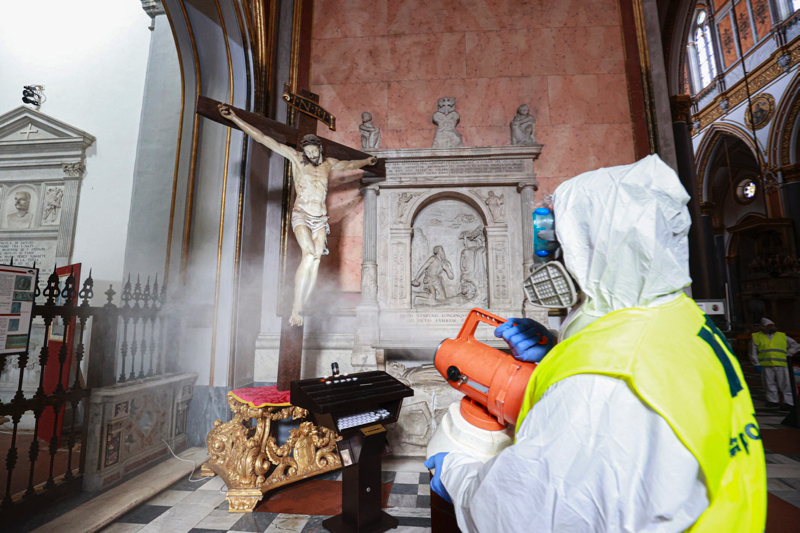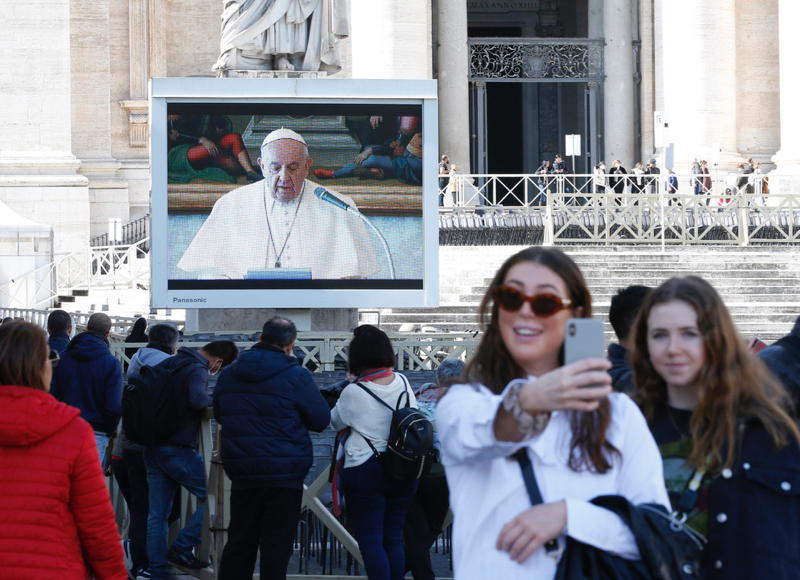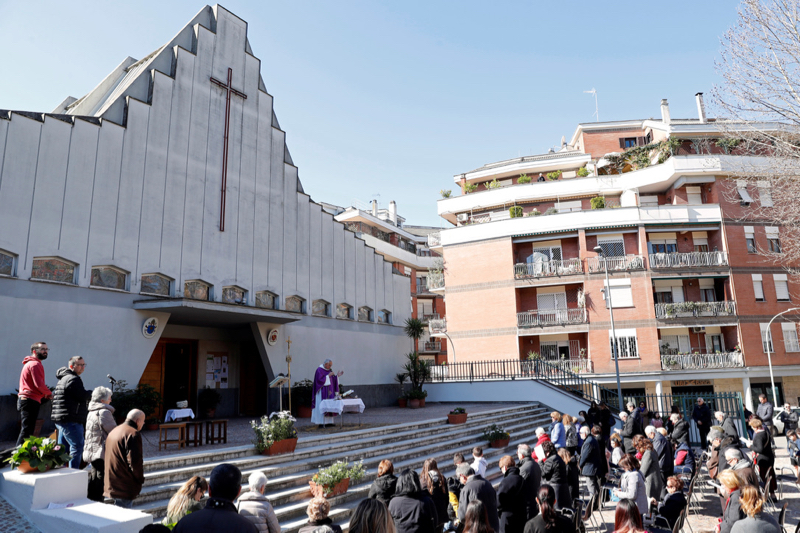Italy has banned all religious ceremonies, including Masses and funerals, in a bid to contain the spread of the coronavirus.
The highly restrictive decision keeps the ban on public liturgies in place until 3 April and comes after the government quarantined 16 million people in the north of the country.
In the Vatican, Pope Francis’ public celebrations of the Angelus and Wednesday audience are taking place behind closed doors and live-streamed into St Peter’s Square. Francis’ private masses in the Casa Santa Marta have been closed off to guests but, for the first time, have been broadcast live online.
“In these days, I will offer Mass for those who are sick from the coronavirus epidemic, for the doctors, nurses, volunteers who are helping them, for their families, for the elderly in nursing homes, for prisoners,” the 83-year-old Pope, who has tested negative for the virus after suffering from a cold, said as he opened the liturgy on Monday morning.
Meanwhile, the Holy See announced the closure of the Vatican museums until 3 April along with all the museums attached to pontifical basilicas and papal villas. This follows the Italian government’s decision to close all museums, cinemas, gyms and archaeological sites.
So far, a single case of the coronavirus has occurred inside the Vatican City State. Andrea Arcangeli, deputy director of the Directorate of Health and Hygiene, explained the individual who contracted the virus was not a resident of the city-state or an employee but someone who had used the Vatican’s health clinic.
On Monday Italy had 7,375 confirmed cases of the coronavirus with 366 deaths. The spread of the virus has turned Rome into a ghost town and people have been told by the government to keep one metre apart from each other in public. Rome has not been quarantined but the decree to lock down the entire northern Lombardy region, which includes the city of Milan, led to thousands to flee to the south of the country sparking fears that the virus will spread further.
In the US precautions taken at St Patrick’s Cathedral in New York are fairly typical, with empty holy water fonts, hand sanitiser at the altar, and no handshakes at Masses. However, an Episcopalian priest at Christ Church in Georgetown who shook hands with more than 500 people after services in late February and early March has tested positive for the coronavirus and all those who came into contact with him or received communion from him have been called on to self-quarantine for 14 days.
 A worker sprays disinfectant to combat the coronavirus in the Basilica of San Domenico Maggiore in Naples, Italy, March 6, 2020.
A worker sprays disinfectant to combat the coronavirus in the Basilica of San Domenico Maggiore in Naples, Italy, March 6, 2020.
Pic: CNS/Fotogramma/IPA/ABACAPRESS.COMNo via Reuters
Elsewhere, the city of Bethlehem in the occupied West Bank has been placed in lockdown after the first cases of the coronavirus. The Church of the Nativity was closed on 5 March and, along with other sites, is expected to be shuttered for a month. This is just weeks ahead of the busy Easter holiday. All tourist buses to and from Bethlehem have been banned until further notice.
The streets in Bethlehem and Ramallah, where the Palestinian government is based, were near empty last weekend.The Marian sanctuary of Lourdes has closed its baths, emptied its holy water fonts and installed hand gel in its confessionals to guard against the coronavirus, but hotels in the southwestern French town say about 15 per cent of their reservations have already been cancelled. The sanctuary still plans to open its season on Palm Sunday and said no cases of the virus had been detected there or in the Hautes-Pyrénées region.
It recommends that pilgrims restrict themselves to a “gesture of water” to wet their faces and hands with water from the apparition cave instead of a bath. “The taps are treated with viricide several times a day,” the sanctuary reassured its website readers.
"We're responsible people. It's obvious that we're doing everything to avoid the spread of the virus inside the sanctuary and to let people come here," said Lourdes rector Mgr Olivier Ribadeau Dumas.
French bishops who met with the Pope on Monday during their "ad limina" visit to Rome sat in chairs that were placed one metre apart, and at a significant distance from Francis.
Many French dioceses, including Paris, have introduced precautions at Mass like avoiding handshakes at the sign of peace, distributing communion only on the hand and not sharing consecrated wine with parishioners. Holy water fonts have also been emptied.
One notable exception was Bishop Pascal Roland of Belley-Ars in eastern France, who wrote that he considered the reaction to the virus an “epidemic of fear” and would not ask his priests to take the precautions taken elsewhere.
The Catholic community in Vietnam reported widespread suffering of Christian families and religious congregations, left without income as factories and schools remain closed.
Lovers of the Holy Cross Sister Anna Do Thi On reported that their nursery school, in Yen Bai city, northwestern Vietnam, has been closed until further notice. “We have suffered heavy financial losses since our school was closed in February,” she said. Her 40-member community depends on the school for its monthly income, with 30 of them working as teachers.
Kenyan Catholic archbishop Martin Kivuva of Mombasa urged the government to train the citizens on coronavirus prevention and management, as cases began to rise in Africa.
Kivuva made the call in Nairobi alongside other faith leaders, who were meeting in the city as the Dialogue Reference Group, a loose grouping of religious leaders steering for unity and reconciliation of which the archbishop is the chairman.
“We need the ministry of health to come up with proper education,” said Kivuva. “All of us are getting the information from all kinds of sources …sometimes we are not too sure. Kenyans are willing to care for themselves, but they require adequate information and skills.”
With 48 cases, Egypt has most declared cases in Africa, followed by Algeria with 17.
Worldwide, more than 111,000 people have been infected and nearly 4,000 have been killed by the virus since it originated in central China in December.



 Loading ...
Loading ...